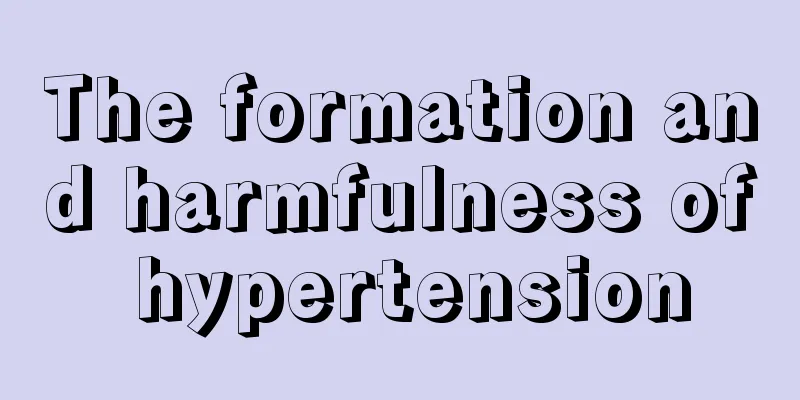The formation and harmfulness of hypertension

|
Nowadays, more and more people are troubled by hypertension. Most of the hypertension diseases are caused by irregular life and diet accumulated over time. Not only that, hypertension can also cause a series of complications, which seriously threaten a person's life. Moreover, the mortality rate caused by hypertension is also very high, so we have to pay attention to hypertension. So what are the causes and dangers of high blood pressure? What are the eight causes of high blood pressure? 1. Heredity. Hypertension has obvious familial clustering and genetic tendency. It is estimated that at least 20%-40% of blood pressure variation in the population is determined by heredity, which is also the cause of hypertension. The probability of children with neither parent having hypertension is 3%; the probability of children with one parent having hypertension is 28%; and the probability of children with both parents having hypertension is 46%. 2. Gender and age. Women’s physiological cycle is quite special. Before menopause, women are much more likely to suffer from high blood pressure than men. However, after menopause, the incidence rate will rise rapidly and even far exceed that of men. 3. High salt. The salt content in the Chinese diet is much higher than that of Western people. In northern my country, people consume 12-18 grams of salt every day; in southern China, each person consumes about 8 grams of salt every day. In addition to high salt content, my country's diet also tends to be low in potassium, calcium, and animal protein. A high-sodium diet is also a cause of high blood pressure, and a low-potassium, low-calcium, and low-animal protein diet will aggravate the adverse effects of high sodium on blood pressure. 4. Bad living habits. Bad living habits and eating habits may cause high blood pressure, especially diet has an important impact on the development of hypertension, coronary heart disease and stroke. Excessive salt intake, heavy drinking, heavy smoking and excessive fat intake can all cause high blood pressure. Other studies have shown that people who often stay up late are more likely to suffer from high blood pressure and even stroke, while those who lead an orderly life and go to bed early and get up early have a lower rate of high blood pressure. 5. Overweight and obesity. Regardless of whether the person has high blood pressure or normal blood pressure, and whether the person is an adult or a teenager, there is a very obvious relationship between arterial blood pressure and their relative weight. The heavier the weight, the greater the possibility of suffering from high blood pressure. This is one of the more common causes of high blood pressure. 6. High pressure in work and life. With the continuous development of society, the pressure of competition is getting greater and greater. Coupled with rising prices and housing prices, people’s life pressure is getting greater and greater, which can easily cause a series of changes in the human body. Among them, the secretion of catecholamines in the body increases, which will cause blood vessel contraction, increase the workload of the heart, and cause high blood pressure. 7. Personality. Personality is closely related to the occurrence of hypertension. People with a quick temper are more likely to develop hypertension. For example, some hormones that cause vasoconstriction are secreted vigorously when you are angry or irritable, and vasoconstriction will cause your blood pressure to rise. 8. Drinking. Drinking a small amount of alcohol will not harm your blood pressure. However, both the systolic and diastolic blood pressure are related to the amount of alcohol consumed each day. Compared with non-drinkers, men who continue to drink have a 40% increased risk of developing hypertension within 4 years. This is the main cause of hypertension. Early stage hazards Headache, mostly in the back of the head, accompanied by nausea, vomiting and other symptoms. If you often have severe headaches and feel nauseous, it may be a sign of a transformation to malignant hypertension. Vertigo, which is more common in female patients and may be felt when squatting or standing up suddenly; tinnitus, tinnitus in both ears, which lasts for a long time; Palpitations and shortness of breath. High blood pressure can lead to myocardial hypertrophy, cardiac enlargement, myocardial infarction, and heart failure, which are all symptoms that lead to palpitations and shortness of breath. Insomnia is often characterized by difficulty falling asleep, early awakening, restless sleep, nightmares, and easy awakening. This is related to cerebral cortical dysfunction and autonomic nervous system dysfunction; Numbness of the limbs, often numbness of the fingers and toes or a crawling sensation on the skin, and inflexible fingers. Numbness may also occur in other parts of the body, as well as paresthesias and even hemiplegia. 2. Mid- to late-stage hazards Damage to blood vessels: Hypertension aggravates sclerosis of small arteries throughout the body, causing ischemia, hypoxia and functional impairment of important organs such as the heart, brain and kidneys; it forms atherosclerosis, which can easily cause blood clots in blood vessels; it can also form aneurysms, and once blood pressure rises suddenly, the rupture of the hemangioma is life-threatening. Damage to the heart: High blood pressure increases the workload on the heart, making ventricular hypertrophy more likely to occur, which can further lead to hypertensive heart disease, coronary heart disease, heart failure, and heart rhythm disorders. Cerebral hemorrhage and cerebral infarction are common in the brain, causing kidney atrophy and then leading to renal failure. The incidence of hypertension is very high, so we must pay more attention to our physical condition in daily life, eat a reasonable diet, exercise properly, and stay away from the harm of hypertension to our body. If you find yourself feeling unwell, you should go to the hospital for diagnosis and treatment in time to avoid the harm of high blood pressure. |
<<: Can I eat chopped green onions during confinement?
>>: What is the difference between boiling tea and making tea
Recommend
Are men who drink milk frequently more likely to get prostate cancer?
Some experts in the United States say that if men...
Nutritional products for middle-aged and elderly people
Nutritional supplements for middle-aged and elder...
The hazards of stainless steel insulated lunch boxes
I believe that lunch boxes are a type of utensil ...
Ma Yinchu also did vascular exercises to prevent cancer
Hot and cold baths are called "vascular exer...
What foods can't you eat when you have internal heat?
"Shanghuo" is a term used in traditiona...
Calories of a roast duck
Roast duck is a delicacy that we often eat in our...
How to ripen bananas the fastest
Bananas have become a common fruit nowadays. The ...
What should I use if I get stung by a thorny hair?
Every time when it gets hot in the summer, a kind...
What's the matter with throat ulcer
I believe everyone is familiar with oral ulcers, ...
How to prevent nasopharyngeal cancer
How to prevent nasopharyngeal cancer? Nasopharyng...
What is the matter with eye opening?
Canthoplasty is a popular micro-plastic surgery i...
Eyeball bleeding
Eyes are very important to us. The structure of t...
What causes cold and sweaty hands and feet?
Some of our friends have cold hands and feet and ...
How to clean glassware?
Glassware is a very commonly used tool in life. I...
How to prevent scars from skin scratches
Whether in life or work, we cannot avoid accident...









